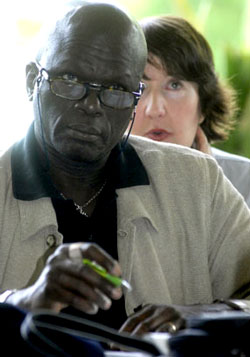UN special investigator tours U.S. (FCN, 06-04-2008)

UNITED NATIONS (FinalCall.com) – Doudou Diene, a Sengalese lawyer and the United Nations Human Rights Council special rapporteur on racism, has completed a tour of eight American cities, where he gathered firsthand information on issues related to racial discrimination and xenophobia.
At a June 6 press conference in the UN Information Center in Washington, D.C., Mr. Diene talked with reporters about some preliminary findings of his three week tour. While citing some positive things such as the nomination of Senator Barack Obama (D-Ill.) as the Democratic Party candidate for the presidency, Mr. Diene focused on U.S. shortcomings such as resegregation of minority communities. The expert on racism and special investigator cited racial bias in the criminal justice system and talked about how underfunding of public education plays a role in deepening racial inequality. Mr. Diene explained he is not a UN employee and that he would be reporting to the UN General Assembly in the spring of 2009, but that his findings would be shared with U.S. government officials.
“We definitely feel that this was an important and timely tour,” said Ajamu Baraka, executive director of the Atlanta-based U.S. Human Rights Network, a coalition of over 250 American social justice and human rights organizations.
Mr. Baraka told The Final Call the Diene tour was an “opportunity to expose the underbelly of White supremacy in the country.” The number one fight for people of color in the 21st century is the fight for human rights, Mr. Baraka said.
In March, his organization charged the Bush administration with failing to comply with its obligations under the International Convention on the Elimination of all forms of Racial Discrimination, an international treaty that the United States signed.
The U.S. Human Rights Network report, known as a shadow report, was filed with the UN committee based in Geneva, Switzerland that monitors compliance with the treaty.
“Our analysis revealed that the Bush administration is utterly out of touch with the reality of racial discrimination in America. The special rapporteur’s tour was an opportunity for the UN to hear from other voices in the U.S. on the issues of racial oppression,” Mr. Baraka said.
Mr. Diene visited New York City, Chicago, Los Angeles, New Orleans, Miami, Puerto Rico and Washington, DC.
In Miami, Mr. Diene heard testimony from Sofian Abdelaziz Zakkout, director of the American Muslim Association of North America, who discussed issues related to immigration, racial profiling and discrimination against the dress of Muslim women.
Aesop Ameen, director of the association’s prison committee, talked about the difficulties Muslims experience in prison when trying to adhere to their faith, including challenges when trying to pray.
Muslim civil rights advocate Ahmed Bedier explained to Mr. Diene how “Islamaphobia” and “anti-Muslim rhetoric” from officials and pundits are contributing to hate crimes against Muslims across Florida.
Tonya Williams, a U.S. Human Rights Network coordinator, told The Final Call grassroots organizations that participated in the forum in New Orleans “were particularly elated with the opportunity to tell their stories.”
The special rapporteur was able to gain knowledge of the “broader implications” of Hurricane Katrina and how the Black populations of Alabama and Mississippi were affected, she said.
Damon Hewitt, an NAACP Legal Defense Fund attorney, said Mr. Diene also got a look into the workings of the prison system through testimony about conditions at the Louisiana State Prison at Angola, a former 18,000 acre slave plantation. Testimony delivered before the special rapporteur showed little has changed in the last several hundred years of the prison’s existence. Even Congress recently heard complaints about the prison’s practice of keeping some inmates in solitary confinement for decades, said advocates.
“We will continue to expose these issues, and we will continue to mobilize people around these issues,” Mr. Baraka told The Final Call.












